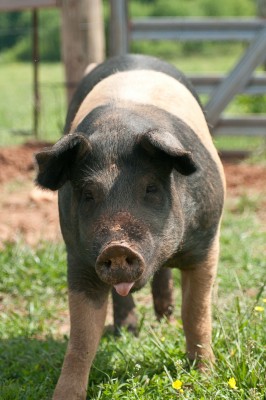African Swine Fever
Katelyn Walley, Business Management Specialist and Team Leader
Southwest New York Dairy, Livestock and Field Crops Program

African Swine Fever (ASF) is a viral disease that is rapidly spreading across Europe and Asia - with potential to affect the North American Swine Industry and have crippling economic impacts. While the disease does not spread to humans, is easily transmitted across hog populations, both wild and domestic.
The ASF virus can survive extreme temperatures for several months and many commonly used disinfectants, and causes high morbidity and mortality. At this time, the United States Department of Agriculture (USDA) does not allow imports of pigs or fresh pork products from affected regions. Symptoms of ASF include high fever, decreased appetite, weakness, skin blemishes, diarrhea, and respiratory illness. The disease is usually fatal, but if hogs do recover, they will continue to be carriers of the virus for several months. There is no vaccine or known treatment for ASF.
Proper biosecurity is the best prevention tool for swine producers. ASF can spread rapidly through direct pig contact, small insects (ticks, flies), contaminated feeds, materials and equipment, carcasses, and wild animals. Prevention can involve keeping pigs healthy and monitoring visitors (and their vehicles, equipment, supplies, etc.). Additionally, producers should not feed raw or undercooked pork products to pigs, and house pigs in an controlled environment when possible. If any pigs do become ill, isolate them and contact your veterinarian. When bringing in any new animals, isolate them for at least two to four weeks to monitor for illness. For more information, visit www.aphis.usda.gov.
Upcoming Events
Boots in the Barn: Cornell Dairy Research Updates
January 13, 2026
January 20, 2026
January 27, 2026
February 3, 2026
February 10, 2026
February 17, 2026
February 24, 2026
Join us for some or all!
Webinar: Converting Old Dairy Barns into swine Facilities
January 21, 2026 : Webinar: Converting Old Dairy Barns into swine Facilities
Tim Terry, Farm Strategic Planning Specialist with Cornell's Pro-Dairy program will share information on what it takes to transition an old dairy barn for swine production. We plan to cover flooring, ventilation, and lighting, considerations for system workability, and more! Registration is free.
Southern Tier Crop Congress
January 28, 2026 : Southern Tier Crop Congress
Belfast, NY
Join SWNYDLFC and CCE Allegany County for the upcoming Southern Tier Crop Congress. CCA and DEC credits are available!
Announcements
Cows, Crops & Critters Newsletter Sponsorship
TRYING TO REACH GROWERS AND AGRIBUSINESSES IN OUR SOUTHWEST REGION OF NEW YORK?Weekly Email Update: Shared with 625+ households who have signed up with our program.
Monthly Paper Mailer: To reach our stakeholders and farmers who lack internet access, we send out a monthly mailer where your company's logo and contact information would be featured with a mailing list of 330+ households.
If you sponsor our weekly and monthly publications you reach approximately 955 households.





